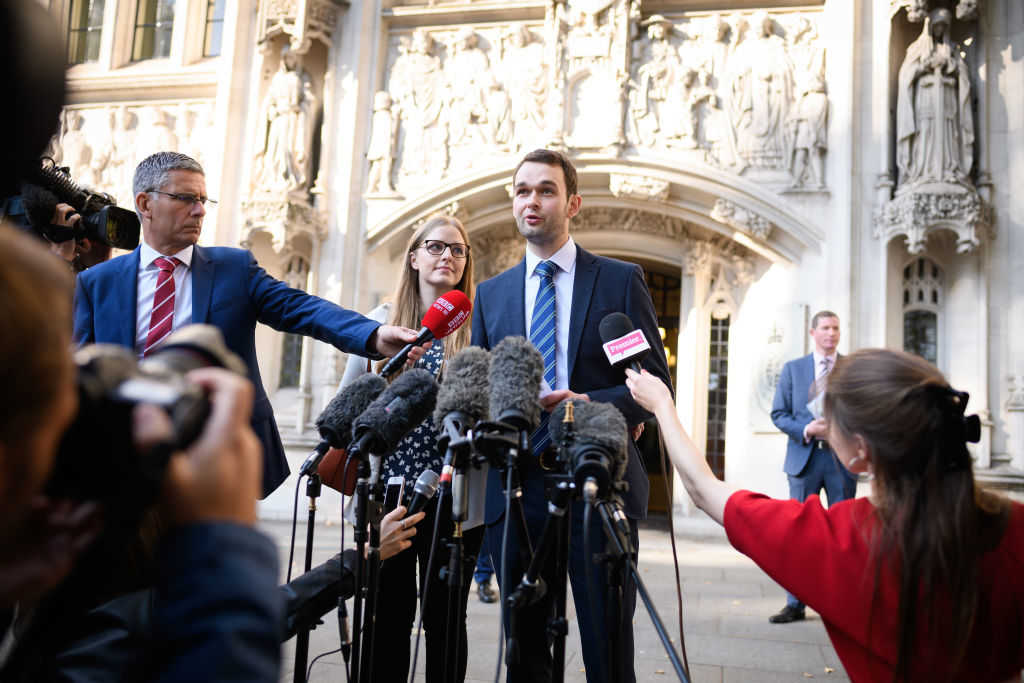The Christian owners of a Northern Irish bakery company have won their appeal with the U.K. Supreme Court after refusing to bake a cake that for a gay wedding.
‘I Wouldn’t Be Here Without My Faith’: Meghan McCain Returns to ‘The View’ After Her Father’s Death
The Belfast-based Ashers Bakery refused to make the cake because the customer requested that it come emblazoned with a slogan that supported same-sex marriage. According to the owners of the bakery, this would have violated their deeply-held religious beliefs.
The Supreme Court ruled that the company’s refusal of service was not discriminatory, as the bakery did not directly discriminate against the customer in question because of their sexuality, but instead refused to endorse something they didn’t believe in — legalizing gay marriage. The claimant, Gareth Lee, instructed the bakery to write “Support Gay Marriage” across the face of the cake.
The ruling comes after a 2015 British court ruling that asserted the bakery had discriminated against Mr. Lee on the basis of his sexuality.
The court ruled that “nobody should be forced to express a political opinion in which he or she does not believe.”
Ashers has always argued it did not discriminate against gay people. It would have refused to make the cake for anyone.
The Supreme Court agreed.
— Matthew Thompson (@mattuthompson) October 10, 2018
“I want to start by thanking God,” owner Daniel McArthur said outside the Supreme Court in London following the latest ruling, according to the Guardian. “He has been with us for the last four years. We are delighted with the ruling. We always knew we had done nothing wrong in turning down the order. We are very grateful to the judges.”
“We did not turn down this order because of the person who made it, but because of the message itself,” he added.
According to the BBC, McArthur also noted that “this ruling protects freedom of speech and freedom of conscience for everyone.”
“It is deeply humiliating, and an affront to human dignity, to deny someone a service because of that person’s race, gender, disability, sexual orientation or any of the other protected personal characteristics,” Supreme Court Judge Lady Hale said in her judgment. “But that is not what happened in this case and it does the project of equal treatment no favors to seek to extend it beyond its proper scope.”
Daniel McArthur of Ashers bakery says he's delighted with the outcome in the so-called #gaycake case. More here: https://t.co/Nr2DhGTkzL pic.twitter.com/WHcfbw6Yni
— BBC News NI (@BBCNewsNI) October 10, 2018
She further added that the McArthurs should not be forced to endorse a political view with which they disagree on account of their faith.
“This court has held that nobody should be forced to have or express a political opinion in which he does not believe,” she wrote.
“The bakers could not refuse to supply their goods to Mr. Lee because he was a gay man or supported gay marriage, but that is quite different from obliging them to supply a cake iced with a message with which they profoundly disagreed.”
Lee, on the other hand, was outraged by the ruling.
“I’m very confused about what this actually means,” he said, as reported by the Guardian. “We need certainty when you go to a business. I’m concerned that this has implications for myself and for every single person.”
After the recent ruling, the Presbyterian Church in Ireland released the following statement, as reported by the Belfast Telegraph:
“In reversing the Appeal Court’s 2016 decision against Ashers Baking Company, the United Kingdom’s Supreme Court has made clear that business owners can in conscience refuse to promote messages that run contrary to their personal beliefs. For businesspeople and private citizens alike, people of faith and no faith at all who want to live in a genuinely pluralist society, today’s landmark decision should be welcomed.
We believe that the unanimous decision of the Supreme Court is an important milestone in helping to strike a proper and much needed balance in law between the legitimate expression of conscience in all aspects of society and protection from unjust discrimination.
As individuals created in the image of God, we are called to love our neighbor so it goes without saying that today’s ruling is not a license to discriminate. On the contrary, in the interests of the common good and human dignity, the law must protect people from discrimination, while properly valuing the role of conscience in the public square.
This case was about discrimination against ideas, not people. The bakery’s owners always said that their issue was with the message on the cake that they were asked to produce and not the customer.”
The case followed a similar trajectory as that of American Christian baker Jack Phillips, whose Supreme Court victory earlier this year was received as a triumph of religious freedom by many. To read more about that ruling, click here.



